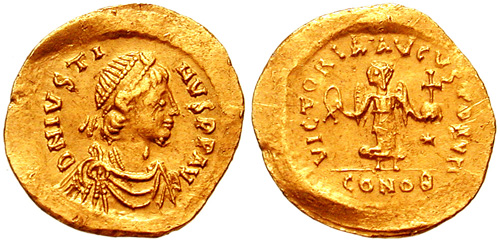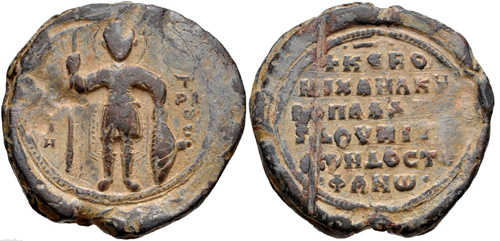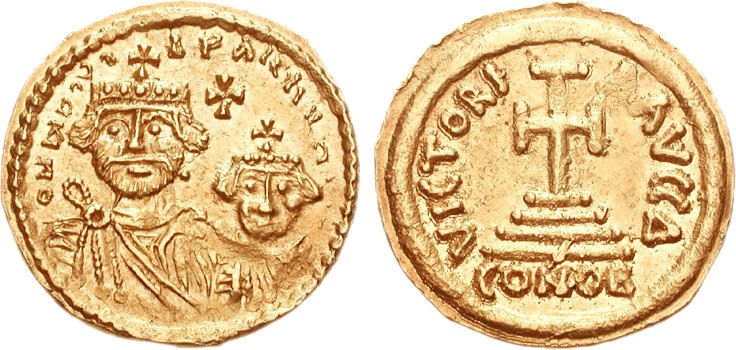|
Baduarius
Baduarius ( el, Βαδουάριος) was an East Roman aristocrat, the son-in-law of Byzantine emperor Justin II (r. 565–578). Theophanes the Confessor erroneously calls him a brother of the Emperor.. Biography Possibly the son or grandson of a similarly named general active in Scythia Minor in 528, Baduarius is recorded by the Latin epic poet Flavius Cresconius Corippus as having succeeded Justin in his post as ''curopalates'' immediately after the latter's rise to the Byzantine throne on November 14, 565. At the time, he was already a holder of the rank of ''patrikios''. In circa 566/567, Baduarius was ordered to raise an army in the lower Danube (Moesia and Scythia Minor) in order to assist the Gepids against the Lombards. The Byzantines won the first battle, but then the Gepid king Cunimund refused to hand back Sirmium as he had promised. Left unaided against the Lombards and Avars, Cunimund was defeated and killed. The post of Baduarius in this campaign is obscure: he ma ... [...More Info...] [...Related Items...] OR: [Wikipedia] [Google] [Baidu] |
Baduarius (Scythia)
Baduarius ( el, Βαδουάριος) was a Byzantine general, active early in the reign of Justinian I (r. 527–565) in Scythia Minor (modern Dobruja). The historian Patrick Amory considers the name Baduarius to be Germanic in origin. Baduarius is mentioned in the writings of John Malalas, John of Nikiû, Theophanes the Confessor and Georgios Kedrenos. He is recorded in Greek as "''stratelates'' of Scythia", hence probably a ''magister militum''. In 528, Baduarius and Godilas led a military expedition from Odessus (modern Varna) against the Huns of Crimea. Under their leader Mougel, the Huns had reportedly captured Byzantine areas on the coasts of the Black Sea.Martindale, Jones & Morris (1992), pp. 163–164 Also in 528, Baduarius is mentioned as ''Dux Scythiae''. He and Justin, ''Dux'' of Moesia Secunda, joined their forces in battle against a force of foreign invaders. Malalas reports "the Huns", whom Theophanes identifies as Bulgars, invading Scythia and Moesia. Either way, ... [...More Info...] [...Related Items...] OR: [Wikipedia] [Google] [Baidu] |
Justinian Dynasty
The Byzantine Empire had its first golden age under the Justinian dynasty, which began in 518 AD with the accession of Justin I. Under the Justinian dynasty, particularly the reign of Justinian I, the empire reached its greatest territorial extent since the fall of its Western counterpart, reincorporating North Africa, southern Illyria, southern Spain, and Italy into the empire. The Justinian dynasty ended in 602 with the deposition of Maurice and the ascension of his successor, Phocas. Justin I Early life and accession to the throne The Justinian dynasty began with the accession of its namesake Justin I to the throne. Justin I was born in a big village, Bederiana, in the 450s CE. Like many country youths, he went to Constantinople and enlisted in the army, where, due to his physical abilities, he became a part of the Excubitors, the palace guards. He fought in the Isaurian and Persian wars, and rose through the ranks to become the commander of the Excubitors, which was a ... [...More Info...] [...Related Items...] OR: [Wikipedia] [Google] [Baidu] |
Curopalates
''Kouropalatēs'', Latinized as ''curopalates'' or ''curopalata'' ( el, κουροπαλάτης, from lat, cura palatii "he one incharge of the palace"). and Anglicized as curopalate, was a Byzantine court title, one of the highest from the time of Emperor Justinian I to the Komnenian period in the 12th century.. The female variant, held by the spouses of the ''kouropalatai'', was ''kouropalatissa''. History and nature of the title The title is first attested (as ''curapalati'') in the early 5th century, as an official of ''vir spectabilis'' rank under the ''castrensis palatii'', charged with the maintenance of the imperial palace (cf. Western European "majordomo"). When Emperor Justinian I () made his nephew and heir Justin II ''curopalates'' in 552, however, the office took on new significance, and became one of the most exalted dignities, ranking next to ''Caesar'' and ''nobilissimus'' and, like them, reserved initially for members of the imperial family. Unlike them, however, ... [...More Info...] [...Related Items...] OR: [Wikipedia] [Google] [Baidu] |
Arabia (daughter Of Justin II)
Arabia ( el, ; fl. 565) was the only recorded daughter of Byzantine Emperor Justin II (r. 565–578) and Empress Sophia. Name and meaning While mentioned in several primary sources, her name is only recorded in the ''Patria of Constantinople''. The name is generally accepted as genuine, though Cyril Mango has raised some doubts in his works. Shahîd's ''Byzantium and the Arabs in the sixth century'' (1995) examines the implications of her name. Arabia appears to be a unique personal name, and she seems to have been named by her great aunt, Empress Theodora, as a show of gratitude to Arab phylarch Arethas. The poem ''In laudem Justini minoris'' ("In praise of the younger Justin") by Flavius Cresconius Corippus, a primary source for the coronation of her father, notes its difference from the conventional and respectable name of her mother,Shahîd (1995), pp. 318–322 indicating that it did sound strange even to a contemporary.Shahîd (1995), p. 392 The name would appear to hav ... [...More Info...] [...Related Items...] OR: [Wikipedia] [Google] [Baidu] |
Byzantine Empire
The Byzantine Empire, also referred to as the Eastern Roman Empire or Byzantium, was the continuation of the Roman Empire primarily in its eastern provinces during Late Antiquity and the Middle Ages, when its capital city was Constantinople. It survived the fragmentation and fall of the Western Roman Empire in the 5th century AD and continued to exist for an additional thousand years until the fall of Constantinople to the Ottoman Empire in 1453. During most of its existence, the empire remained the most powerful economic, cultural, and military force in Europe. The terms "Byzantine Empire" and "Eastern Roman Empire" were coined after the end of the realm; its citizens continued to refer to their empire as the Roman Empire, and to themselves as Romans—a term which Greeks continued to use for themselves into Ottoman times. Although the Roman state continued and its traditions were maintained, modern historians prefer to differentiate the Byzantine Empire from Ancient Rome ... [...More Info...] [...Related Items...] OR: [Wikipedia] [Google] [Baidu] |
Avars (Carpathians)
The Pannonian Avars () were an alliance of several groups of Eurasian nomads of various origins. The peoples were also known as the Obri in chronicles of Rus, the Abaroi or Varchonitai ( el, Βαρχονίτες, Varchonítes), or Pseudo-Avars in Byzantine sources, and the Apar ( otk, 𐰯𐰺) to the Göktürks (). They established the Avar Khaganate, which spanned the Pannonian Basin and considerable areas of Central and Eastern Europe from the late 6th to the early 9th century. The name Pannonian Avars (after the area in which they settled) is used to distinguish them from the Avars of the Caucasus, a separate people with whom the Pannonian Avars might or might not have had links. Although the name ''Avar'' first appeared in the mid-5th century, the Pannonian Avars entered the historical scene in the mid-6th century, on the Pontic–Caspian steppe as a people who wished to escape the rule of the Göktürks. They are probably best known for their invasions and destruction in ... [...More Info...] [...Related Items...] OR: [Wikipedia] [Google] [Baidu] |
6th-century Byzantine People
The 6th century is the period from 501 through 600 in line with the Julian calendar. In the West, the century marks the end of Classical Antiquity and the beginning of the Middle Ages. The collapse of the Western Roman Empire late in the previous century left Europe fractured into many small Germanic kingdoms competing fiercely for land and wealth. From the upheaval the Franks rose to prominence and carved out a sizeable domain covering much of modern France and Germany. Meanwhile, the surviving Eastern Roman Empire began to expand under Emperor Justinian, who recaptured North Africa from the Vandals and attempted fully to recover Italy as well, in the hope of reinstating Roman control over the lands once ruled by the Western Roman Empire. In its second Golden Age, the Sassanid Empire reached the peak of its power under Khosrau I in the 6th century.Roberts, J: "History of the World.". Penguin, 1994. The classical Gupta Empire of Northern India, largely overrun by the Huna, ended ... [...More Info...] [...Related Items...] OR: [Wikipedia] [Google] [Baidu] |
570s Deaths , a semi-automatic pistol
{{Numberdis ...
57 may refer to: * 57 (number) * one of the years 57 BC, AD 57, 1957, 2057 * "57" (song), a song by Biffy Clyro * "Fifty Seven", a song by Karma to Burn from the album ''Arch Stanton'', 2014 * "57" (album), a studio album by Klaus Major Heuser Band in 2014 * "57 Live" (album), a live double-album by Klaus Major Heuser Band in 2015 * Heinz 57 (varieties), a former advertising slogan * Maybach 57, a car * American Base Hospital No. 57 * Swift Current 57's, baseball team in the Western Canadian Baseball League * FN Five-Seven The FN Five-seven (stylized as Five-seveN) is a semi-automatic pistol designed and manufactured by FN Herstal in Belgium. The pistol is named for its 5.7×28mm (.224 in) bullet diameter, and the trademark capitalization style is intended to ... [...More Info...] [...Related Items...] OR: [Wikipedia] [Google] [Baidu] |
Nursemaid
A nursemaid (or nursery maid) is a mostly historical term for a female domestic worker who cares for children within a large household. The term implies that she is an assistant to an older and more experienced employee, a role usually known as nurse or nanny. A family wealthy enough to have multiple servants looking after the children would have a large domestic staff, traditionally within a strict hierarchy, and a large house (or possibly several, such as the townhouse and country house) with nursery quarters. History The term 'nursemaid' has wide historical use, mostly related to servants charged with the actual care of children. In ancient usage the terms 'nursemaid' and 'nurse' (as, for example, the character in Shakespeare's Romeo and Juliet) are largely interchangeable. Everything that a parent ordinarily might do, especially the more onerous tasks, could be turned over to a nursemaid. Feeding very young children and supervising somewhat older children at meal times, seein ... [...More Info...] [...Related Items...] OR: [Wikipedia] [Google] [Baidu] |
Cyril Mango
Cyril Alexander Mango (14 April 1928 – 8 February 2021) was a British scholar of the history, art, and architecture of the Byzantine Empire. He is celebrated as one of the leading Byzantinists of the 20th century. Mango was Koraes Professor of Modern Greek and Byzantine History, Language and Literature at King's College London, the University of Oxford Bywater and Sotheby Professor Emeritus of Byzantine and Modern Greek Language and Literature and emeritus professorial fellow of Exeter College, Oxford. Early life and education Mango was born on 14 April 1928 in Istanbul, Turkey, the youngest of three sons of Alexander A. Mango, a descendant of a Genoese family who came to Istanbul via Chios, and Adelaide, known as Ada, (''née'' Damonov) Mango, a refugee from Baku. One of his brothers, Andrew Mango, who lived and worked in London becoming head of the South East European Service of the BBC World Service, was also a respected scholar and author on Turkey. His other brother, ... [...More Info...] [...Related Items...] OR: [Wikipedia] [Google] [Baidu] |
Italy
Italy ( it, Italia ), officially the Italian Republic, ) or the Republic of Italy, is a country in Southern Europe. It is located in the middle of the Mediterranean Sea, and its territory largely coincides with the homonymous geographical region. Italy is also considered part of Western Europe, and shares land borders with France, Switzerland, Austria, Slovenia and the enclaved microstates of Vatican City and San Marino. It has a territorial exclave in Switzerland, Campione. Italy covers an area of , with a population of over 60 million. It is the third-most populous member state of the European Union, the sixth-most populous country in Europe, and the tenth-largest country in the continent by land area. Italy's capital and largest city is Rome. Italy was the native place of many civilizations such as the Italic peoples and the Etruscans, while due to its central geographic location in Southern Europe and the Mediterranean, the country has also historically been home ... [...More Info...] [...Related Items...] OR: [Wikipedia] [Google] [Baidu] |



